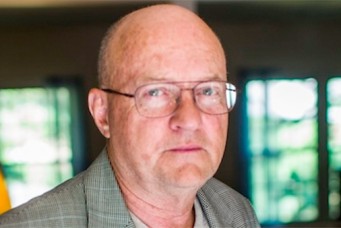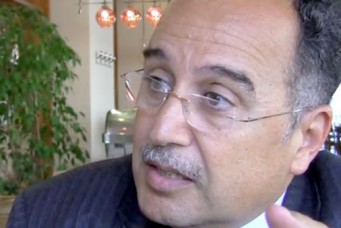Foreign Policy, Interrupted
To respond to a stark gender disparity in foreign affairs, a new non-profit works to get more women miked, quoted, and bylined.
When I moved to the Middle East five years ago, I joined the ranks of a predominantly female press corps. While covering some of the most important moments in the region’s modern history, I noticed a startling gender disparity. I found myself regularly quoting male experts, often because they were much more willing to offer analysis.
When I would call upon a woman analyst for her opinions on Bahrain’s sectarian conflict or Egypt’s political carousel, I’d frequently encounter insecurity masquerading as modesty or busyness. “I’m just not read in enough on the topic.” Or, “This isn’t exactly my area of expertise.” When I would call a man, he could be on the tarmac, five minutes from takeoff, but he would be ready to rattle off a book proposal on an event that transpired moments ago.
For decades, the Middle East has been one of the regions most heavily covered by Western journalists. Women like the New York Times’ Anne Barnard and the BBC’s Lyse Doucet often lead the coverage from the frontlines. Yet, when it comes to analyzing Middle East events, the media cite male experts much more often than female ones. Women today hold crucial roles in foreign policy, as secretaries of state, National Security Council advisors, and chief editors. Yet it’s still usually men who shape our worldviews.
Tired of asking “Where are the women?,” New York University lecturer Elmira Bayrasli and I started Foreign Policy Interrupted two years ago. FPI is a non-profit initiative (most of our services are free of charge) dedicated to getting more women in foreign affairs miked, quoted, and bylined.
The male talkfest isn’t just anecdotal. Last year, six leading Washington think tanks presented more than 150 events on Middle East topics that included not a single woman speaker. Women author only 10 to 20 percent of op-eds published in the United States. Last year, the Women’s Media Center found that on the front page of the New York Times in January and February 2013, men were quoted three times more often than women. In a study done by FPI and Media Matters for America, we found that women made up just 22 percent of foreign policy guests on major American news programs in 2014. A woman on cable news talking about foreign affairs or national security is more likely to be a reporter or news personality rather than a professional foreign policy analyst.
FPI runs a website (www.fpinterrupted.com) and publishes a weekly newsletter, sharing stories and analysis by women and providing lists pointing editors and producers to women with expertise on various foreign policy topics. We are in the planning stages of a fellowship program to provide women in fields like journalism, development, academia, and government with media training, networking opportunities, and a non-residential “externship” at a major news outlet. Fellows will publish their opinions and analyses, and quite literally change the antiquated ratio.
Gender disparity in media is not due to a supply problem. There is a wealth of female foreign policy experts. But there is also a rusty and leaking pipeline that must be replaced.
Two main forces drive the gender disparity. One is institutional. There’s of course deeply entrenched societal sexism, which has birthed a tendency to look toward “authoritative” male voices, as well as intellectual laziness. Plus, producers and editors have busy jobs. In a 140-character-driven news cycle, they are under pressure to push out news immediately and frequently. They don’t develop the bandwidth to cultivate new voices, falling back on whom they know: usually a long list of white men and a handful of go-to women. As FPI’s founding board member Anne-Marie Slaughter, president and CEO of the New America Foundation, jokes, “I’m called on to opine on everything from Syria to Siberia.”
There are also internal barriers that preclude women from owning their expertise. Studies show that women hold themselves to a higher threshold of certainty before they offer an opinion. While men overestimate their abilities and performance, women underestimate both. Most of the queries FPI receives are from women who are nervous to pitch an editor and seek guidance in doing so. At the core of their queries is actually a request for permission to opine. Most of the time, women have spent extensive time in the field and have the academic chops to back them up, but they still don’t feel comfortable claiming their expertise.
The confidence gap doesn’t exist in a vacuum. As columnist Jessica Valenti writes, women’s lack of confidence could be a keen reflection of just how little society, and the media conversation, values their opinions. Hillary Clinton, former First Lady, U.S. senator, secretary of state, who is currently a candidate for president, reportedly once said, “If I want to knock a story off the front page, I just change my hairstyle.”
The solution must include creating a space that values women’s voices. That means collaborating with men, who make up most of the leadership on editorial and executive boards, and implementing creative solutions. For instance, Foreign Policy magazine CEO and Editor David Rothkopf has not only sought more female writers but has also pledged not to appear on panels that don’t include women.
The disrupting shouldn’t be focused on just the gender divide. Why are so few expert voices from the “developing world” called upon to opine on the “developing world”? Why are foreign policy analysts typically white? When you incubate diverse voices, you incubate new ideas and approaches to foreign policy challenges—in the Middle East, China, Russia, the world.
Media representation is merely a broken mirror if it doesn’t reflect the societies it aims to represent. Currently, it’s a system that privileges white, male voices over those of others who are an important part of an interconnected and dynamic world. Overcoming the media gender gap requires a collective movement. It’s time for the foreign policy conversation to catch up with our diverse realities.
Lauren E. Bohn is Middle East correspondent for the Ground Truth Project and contributing editor of the Cairo Review of Global Affairs




